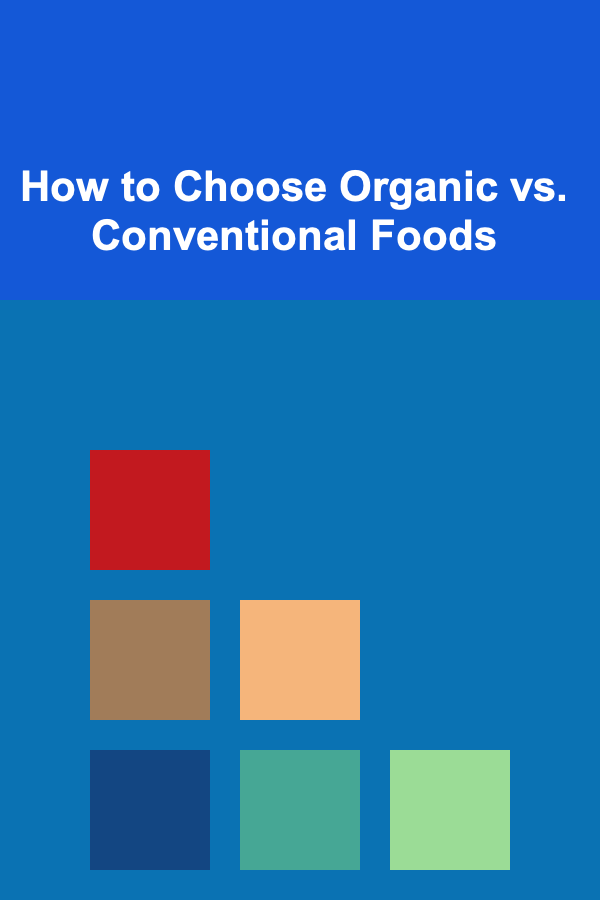
How to Choose Organic vs. Conventional Foods
ebook include PDF & Audio bundle (Micro Guide)
$12.99$10.99
Limited Time Offer! Order within the next:

In recent years, there has been growing awareness about food choices, especially the debate surrounding organic and conventional foods. As people become more concerned about the health of their bodies, the environment, and the food they consume, understanding the differences between organic and conventional foods becomes increasingly important. This article explores the nuances of both types of food, providing insights into their production methods, nutritional differences, environmental impacts, and economic considerations. Ultimately, this guide aims to help consumers make informed decisions about what to put on their plates.
Understanding Organic vs. Conventional Foods
Before diving into the decision-making process, it's important to define what constitutes organic and conventional foods.
Organic Foods
Organic foods are grown without the use of synthetic pesticides, herbicides, or genetically modified organisms (GMOs). The agricultural practices used to produce organic food are regulated by certifying organizations, such as the United States Department of Agriculture (USDA) or the European Union's organic certification system. To be labeled as organic, food products must meet strict criteria, including:
- No use of synthetic chemicals or pesticides
- No GMOs
- Use of crop rotation to maintain soil fertility
- Animals must be raised in humane conditions and fed organic feed, without antibiotics or hormones
Organic farming methods focus on sustainability, biodiversity, and soil health, often incorporating practices like composting, mulching, and using natural predators to control pests.
Conventional Foods
Conventional foods, on the other hand, are grown using standard industrial farming practices. These include the use of synthetic chemicals, pesticides, herbicides, and often genetically modified seeds. Conventional farming methods prioritize maximizing yield and efficiency, sometimes at the expense of soil health and biodiversity. While conventional farming may be more efficient in terms of production and cost, it often raises concerns about the impact of chemicals on health and the environment.
Health Considerations: Organic vs. Conventional Foods
One of the most important reasons people choose organic food is to avoid synthetic chemicals and pesticides. But how significant is the health benefit of choosing organic over conventional food? Let's take a deeper look into this issue.
Pesticide Residues
One of the most frequently cited reasons for choosing organic food is to avoid exposure to pesticide residues. Pesticides are commonly used in conventional farming to protect crops from pests and disease. However, there is concern that these chemicals may linger on the food we consume and, over time, could contribute to health issues, including cancer, neurological damage, and endocrine disruption.
Numerous studies have shown that organic foods typically contain fewer pesticide residues compared to conventional foods. For example, a study published in the Journal of the American Medical Association found that organic foods contain significantly lower levels of pesticide residues compared to their conventional counterparts. While the pesticide levels in conventional foods are regulated by the government to ensure they fall within safe limits, many consumers prefer to reduce their exposure to these chemicals entirely, which is a key reason they choose organic.
Nutritional Content
Another concern often associated with conventional foods is the nutritional content. Some studies suggest that organic foods may have higher levels of certain nutrients compared to conventional foods. For instance, organic fruits and vegetables may have higher concentrations of vitamin C, antioxidants, and omega-3 fatty acids. These nutrients play essential roles in supporting overall health, immune function, and reducing inflammation in the body.
However, the nutritional difference between organic and conventional foods is still a subject of debate among scientists. Some studies have shown minimal differences in nutrient content, while others suggest that organic foods provide significant advantages in terms of vitamins, minerals, and antioxidants. Regardless, organic food advocates believe that by avoiding the use of synthetic chemicals, organic farming helps to retain the natural nutrient levels of crops.
Antibiotics and Hormones
The use of antibiotics and growth hormones in conventional animal farming is another health concern for many people. Conventional livestock farming often involves the routine use of antibiotics to prevent disease and promote growth. This can contribute to the rise of antibiotic-resistant bacteria, which poses a significant public health threat. Organic farming prohibits the use of antibiotics and growth hormones, which is why organic meat, dairy, and poultry are often considered safer for consumers.
Consumers choosing organic meat products are typically avoiding exposure to these drugs, which can have long-term health consequences if consumed in large amounts over time.
Environmental Impact: Organic vs. Conventional Foods
In addition to the health benefits, many consumers choose organic foods for environmental reasons. The practices involved in organic farming have less impact on the environment compared to conventional farming methods.
Soil Health and Biodiversity
Organic farming practices prioritize soil health and biodiversity. By avoiding synthetic chemicals and fertilizers, organic farmers focus on maintaining healthy soils through natural processes such as crop rotation, cover cropping, and the use of compost. These methods help preserve soil fertility, reduce erosion, and prevent the depletion of essential nutrients in the soil.
In contrast, conventional farming methods often rely heavily on chemical fertilizers and pesticides, which can degrade soil quality over time. The use of these chemicals can also harm beneficial soil organisms, such as earthworms and microbes, which are essential for maintaining healthy soil.
Water Use and Pollution
Conventional farming practices can also contribute to water pollution. The runoff from chemical fertilizers and pesticides can contaminate nearby water sources, harming aquatic ecosystems and potentially making the water unsafe for human consumption. Organic farming, by contrast, minimizes chemical runoff by using natural pest management techniques and reducing reliance on synthetic fertilizers.
Additionally, organic farms tend to use more water-efficient practices, including mulching and drip irrigation, which help conserve water resources. This is especially important in areas where water scarcity is a significant concern.
Carbon Footprint
Another aspect of the environmental impact is the carbon footprint of food production. Conventional farming, particularly industrial agriculture, tends to have a larger carbon footprint due to the heavy use of fossil fuels in machinery, transportation, and the production of synthetic fertilizers and pesticides. Organic farming, with its emphasis on sustainability and fewer chemicals, generally has a smaller carbon footprint.
Moreover, the focus on improving soil health through organic farming practices can help sequester carbon in the soil, which may offset some of the carbon emissions produced during farming.
Economic Considerations: Organic vs. Conventional Foods
While the environmental and health benefits of organic foods are compelling, the economic factor cannot be ignored. Organic foods are often more expensive than conventional foods, and this price difference can influence consumer choices.
Cost of Production
Organic farming generally requires more labor-intensive methods, such as manual weeding and crop rotation, as opposed to relying on chemical herbicides and fertilizers. These practices can result in lower yields and higher production costs, which are then passed on to consumers in the form of higher prices. Additionally, organic certification processes involve fees and inspections, further adding to the cost of production.
In contrast, conventional farming uses more automated processes and synthetic chemicals, which reduce labor costs and increase productivity, allowing for lower prices at the consumer level.
Price vs. Value
While organic foods tend to be more expensive, many consumers believe that the higher cost is justified by the perceived benefits to health and the environment. Organic food advocates argue that the long-term health benefits and environmental sustainability make the investment worthwhile.
For some, the choice to buy organic is not just about price but about supporting local, sustainable farming practices and promoting ethical treatment of animals. For others, the price difference may be a barrier, making it more challenging to consistently buy organic.
How to Make an Informed Decision
Choosing between organic and conventional foods can be challenging, especially when considering the various factors involved. Here are some tips to help you make a more informed decision:
1. Prioritize Your Needs
Identify what matters most to you. If you're primarily concerned about your health, you may choose organic for certain items, such as fruits and vegetables that are heavily treated with pesticides. If environmental impact is your top concern, organic foods are often a better choice because of their sustainability practices.
2. Consider the "Dirty Dozen"
The Environmental Working Group (EWG) publishes a list known as the "Dirty Dozen," which highlights the twelve most pesticide-heavy fruits and vegetables. If you're on a budget but want to reduce pesticide exposure, focusing on organic versions of these produce items can be a smart decision.
3. Local and Seasonal Options
Sometimes, local and seasonal conventional produce can be a good alternative to organic foods. Local farmers often use fewer chemicals and may employ more sustainable farming practices, even if they aren't certified organic. Supporting local farms can help reduce your environmental impact, while also saving money.
4. Educate Yourself About Certification Labels
If you decide to buy organic, be sure to look for trusted certification labels, such as the USDA Organic label, to ensure that the food you are purchasing meets organic standards. This helps protect you from misleading claims and ensures you are truly buying organic food.
Conclusion
The decision between organic and conventional foods is a personal one, shaped by various health, environmental, and economic factors. Organic foods offer distinct advantages in terms of reducing pesticide exposure, promoting sustainability, and supporting animal welfare. However, the higher cost of organic foods may be a deterrent for some consumers.
By educating yourself about the differences between organic and conventional foods, understanding your personal priorities, and considering factors like local options, you can make choices that align with your values and health needs. Whether you choose organic or conventional, the most important thing is to make informed decisions that support your overall well-being and the planet's health.

How to Align Your Content Strategy with Your Sales Funnel
Read More
How to Ensure Your Products Are Customs-Compliant When Shipping Abroad
Read More
How To Interact with Children in Different Cultures
Read More
Mastering Retail Management: Essential Skills for Managing People and Profits
Read More
How to Manage Livestock to Coexist with Wildlife
Read More
How to Install a GFCI Outlet
Read MoreOther Products

How to Align Your Content Strategy with Your Sales Funnel
Read More
How to Ensure Your Products Are Customs-Compliant When Shipping Abroad
Read More
How To Interact with Children in Different Cultures
Read More
Mastering Retail Management: Essential Skills for Managing People and Profits
Read More
How to Manage Livestock to Coexist with Wildlife
Read More